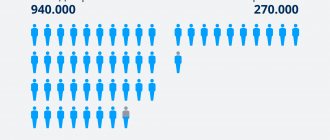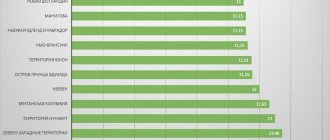Minimum wage level
In Poland, there is a clear distinction between gross wages - the amount that is calculated in accordance with the law, and net wages - the one that the employee receives after deducting all taxes. The minimum wage in Poland from January 1, 2021 is at least 2,100 gross zlotys (approximately 500 euros). At the minimum rate, a Pole earns 13.7 zlotys per hour.
If an employee has entered into a part-time contract, then his salary is calculated based on the number of hours worked and an hourly wage in the amount of 13 zlotys 70 grosz per hour. An employer simply does not have the right to pay its employees less than provided by law - for violation it faces a fine of up to 3 million zlotys.
Minimum wage in Poland
The minimum salary increased in 2021 to 2100 zlotys gross; after taxes, 1617 zlotys remain, which is around $444. This is the lowest salary that an employee is required to receive per month, subject to a week worked (5 days of 8 hours). The minimum hourly rate is PLN 13.70 and this amount must be paid to the person hired under the contract.
Increase in the minimum wage in Poland since 2000.
Average wages
As in any country, average earnings depend on many factors. In the capital, port cities and large industrial centers, pay per hour is usually higher, and in the provinces and agricultural regions it is lower. The salary levels of programmers and workers, teachers and doctors are also different. Pay for public sector workers in Poland is traditionally higher than the national average, and university and college graduates in their first years of work are about 40% lower than their more experienced colleagues.
Based on the results of the first months of 2021, the average salary in Poland in euros is more than a thousand (almost 4,600 zlotys) - this is evidenced by the report of the country's Main Statistical Office.
At the same time, in Warsaw it is almost 5800 zlotys, Gdansk and Katowice - 5100-5300, in Krakow a little more than 4.5 thousand, in other cities the figures are lower. At the same time, 8% of workers have salaries that are twice the average.
Warsaw, Poland economic development
Poland is proving to be one of the most dynamically developing countries in Europe. It currently exhibits consistent positive GDP growth rates year after year. If you move to Warsaw, you can expect a much more economically vibrant city than most EU capitals. The main reasons for this are lower salaries and taxes compared to their neighbors to the west. Due to these reasons, many EU partner countries have been relocating part of their activities to Poland since 2004.
Warsaw not only has great opportunities for young professionals, but also a great city to start a business. The city has seen a constant influx of new residents from other parts of Poland, as well as from countries such as Ukraine, Belarus and Vietnam. Finally, the quality of life in Poland is quite high. Warsaw is safer than most European cities and its quality of services is better than the average public services in Central Europe.
Thank you for reading the article “Minimum and average wages in Poland, Warsaw.” If you have interesting stories, write them to us by email or in the comments. See you soon. Your secrets in your ear!
Share with your friends:
Also worth reading:
- Salary in Lithuania, Vilnius and standard of living The minimum and average salary in Lithuania, Vilnius are important figures to understand the dynamics of the economy of this Baltic nation in the euro zone. If you are planning to move to the Baltic countries, the minimum…
- Salary in Portugal, Lisbon and standard of living The average and minimum salary in Portugal, Lisbon are important indicators of how the Portuguese economy is facing its current challenges. If you are planning to move to Lisbon, the average and…
- Average salary in Montenegro and standard of living The average and minimum salary in Montenegro are useful figures for those considering moving, working or investing in this southern European country. Are you planning to move…
Salaries in various industries
The level of wages largely depends on the industry in which Poles work.
The highest level of income is for employees of IT companies – 8,000 zlotys or about 2 thousand euros. The salaries of those who work in the field of catering, services, and agriculture are much lower. Thus, the salary for a hairdresser and makeup artist will be no more than 500 euros.
Work in the construction industry is highly paid (3000-4000 zlotys), as well as transporting goods over long distances - the salary of truckers starts from 3500 zlotys. Civil servants have high salaries - on average 4,500 zlotys; in industrial enterprises you can earn up to 5 thousand in Poland. However, it should be borne in mind that taxes and insurance reduce gross wages by almost PLN 1,000.
Salary by profession
On the Polish labor market, both representatives of highly paid professions and those that are not very highly paid are in demand. Speaking about what salaries are in Poland by profession, it should be noted that wages differ markedly depending on the specialty (net salaries are given - that is, the amounts that workers receive in their hands):
- Doctors, depending on their workload and place of work, receive an average of 1,420 euros. At the same time, in public clinics their salaries are much lower than in private ones;
- programmers - 1200 -1400 euros, although the gross salary can reach up to 2 thousand euros;
- a bank employee receives an average of 1,200 euros - this is the second highest salary in the ranking of professions after programmers;
- professors, scientists - over 1000 euros;
- drivers of category C+ E earn 700-1100 euros in Poland;
- The salary of a welder, depending on qualifications and welding method, ranges from 700 to 1000 euros.
How labor is paid by region
Capital salaries are higher than provincial ones; in addition, wages traditionally differ in different regions of the country. The highest salaries are in port cities and industrial regions, the lowest in agricultural areas in the southeast of the country.
The highest wages in 2021 are recorded in the following voivodeships:
- Mazowieckie (Warsaw) – 5860 zlotys (1365 euros);
- Silesian (Katowice) – 4890 zlotys (1140 euros);
- Pomeranian (Gdansk) – 4830 zlotys (1125 euros).
The lowest wages were recorded in the following voivodeships:
- Podlasie (Bialystok) – 4100 zlotys (955 euros);
- Podkarpackie (Rzeszow) – 3968 zlotys (925 euros);
- Warmia-Masuria (Olsztyn) – 3968 zlotys (925 euros).
How is the national average calculated?
Enterprise sector: PLN 4852.29 - PLN 5169.06 - PLN 5,411.45.
An interesting indicator is also the average monthly salary in individual voivodeships, which shows where on average you earn the most and where you earn the least.
When calculating the national average, the business sector and only employment contracts are taken into account. The wages of persons working under civil contracts (umova zletseniya and umova o dzelo) are not taken into account. Moreover, the statistics do not include companies with fewer than 10 employees. For comparison, enterprises of this type are taken into account in the average monthly wage in the national economy.
Average wages are calculated by the Central Statistical Office for individual months, quarters and years. The Central Statistical Office provides the total amount.
According to the methodology for calculating the national average (in the enterprise sector), it is “the ratio of the sum of gross wages and salaries, fees paid to certain groups of employees for work under an employment contract, profit-sharing payments or balance sheet surplus in cooperatives in relation to the average number of employees employed in a given period; after eliminating homeworkers and people working abroad. "
What salary taxes are levied in Poland?

Currently, the country has 12 types of taxes: profit, excise, VAT, inheritance and others, while only income tax is levied on wages.
The amount of tax depends on the amount of income received. If the annual income does not exceed PLN 85,528, the employee must pay a tax of 18%. If the annual salary is more than PLN 85,528, the tax increases to 32%.
However, no tax is charged on annual income less than PLN 3,091.
In addition, social insurance contributions are withheld from gross wages (pension - 9.76%, sick leave - 2.45%, rent - 1.5%). On average, 27% of income goes to deductions. To understand how much an employee will receive (net), you should multiply the salary that you are promised by 0.7. For example, if earnings are 3,000 zlotys, then the worker will receive 2,190 zlotys, and 810 will be given to the state.
Average salary in Poland
According to official data from the Polish Central Statistical Office, before taxes, the average salary in Poland in 2021 is 5,331.47 zlotys per month , which corresponds to $1,265. After all mandatory deductions, the Polish employee is left with 3,847.48 zlotys or $915.
AVERAGE SALARY IN POLAND BY ECONOMIC SECTOR
| Economic sector | Zlotys per month | Dollars per month |
| Information and communication | 8 790,32 | 2 085 |
| Mining | 8 455,94 | 2 005 |
| Financial and insurance activities | 8 236,86 | 1 955 |
| Supply of electricity, gas, steam and air conditioning | 7 823,10 | 1 855 |
| Professional, scientific and technical activities | 7 253,83 | 1 720 |
| Public Administration and Defense | 5 977,74 | 1 420 |
| Fisheries, Agriculture and Forestry | 5 603,19 | 1 330 |
| Real estate transactions | 5 338,91 | 1 265 |
| Construction | 5 215,04 | 1 240 |
| Health and social work | 4 947,76 | 1 175 |
| Production | 4 940,06 | 1 170 |
| Education | 4 878,23 | 1 160 |
| Wholesale and retail trade | 4 825,60 | 1 145 |
| Water supply, sewerage and waste management | 4 707,99 | 1 120 |
| Transportation and storage | 4 639,13 | 1 100 |
| Administrative and support services | 3 789,30 | 900 |
| Accommodation and meals | 3 761,31 | 895 |
In the first quarter of 2021, compared to the same period last year, the average monthly salary in Poland increased by 3.2% in the Fisheries, Agriculture and Forestry sector and by 11.4% in the Administrative and Support Services sector, resulting in an increase in the overall average salary in Poland by 7%.
AVERAGE SALARY IN POLAND BY REGION
| Voivodeship | Zlotys per month | Dollars per month |
| Lower Silesian (Wroclaw) | 5 670,27 | 1 345 |
| Silesian (Katowice) | 5 574,69 | 1 325 |
| Lesser Poland (Krakow) | 5 472,65 | 1 300 |
| Pomeranian (Gdansk) | 5 458,61 | 1 295 |
| Lodz (Lodz) | 5 188,31 | 1 230 |
| West Pomeranian (Szczecin) | 5 053,65 | 1 200 |
| Mazowieckie (Warsaw) | 5 013,66 | 1 190 |
| Wielkopolska (Poznan) | 4 990,72 | 1 185 |
| Opole (Opole) | 4 943,94 | 1 175 |
| Podlasie (Białystok) | 4 886,70 | 1 160 |
| Lubuskie (Gorzow Wielkopolski and Zielona Gora) | 4 825,60 | 1 145 |
| Lyublinskoe (Lublin) | 4 801,72 | 1 140 |
| Świętokrzyskie (Kielce) | 4 780,91 | 1 135 |
| Podkarpackie (Rzeszow) | 4 618,04 | 1 095 |
| Warmia-Masuria (Olsztyn) | 4 574,70 | 1 085 |
Note : Information on average salaries in Poland by economic sector and region is based on current official data from the Polish Central Statistical Office.
In conclusion, we note that the unemployment rate in Poland is about 5.5%, and the income tax rate in 2021 varies from 18% (income up to PLN 85,528 per year) to 32% (income over PLN 85,528 per year).
How can foreigners find work in Poland?
More and more Ukrainians, Belarusians, Russians and other residents of the CIS are leaving for temporary or permanent work in Poland. In order to officially get a job in the Polish state, they need a passport and a visa. Today a work visa can be issued for six months, a year or a season. In addition, you must have a work permit and an employment contract with the employer, which specifies working conditions, insurance and wages.
After the introduction of a visa-free regime with EU countries, many Ukrainians and Moldovans travel to Poland without first obtaining a visa.
However, it should be borne in mind that having a biometric passport alone does not give the right to employment, and illegal work is fraught with unpleasant consequences, including deportation from the country.
Mostly in Poland, low-skilled personnel are required to work in the fields, in the garden, and on construction sites. At the same time, there is a fairly high demand for medical workers and programmers. However, for employment they need knowledge of Polish or English.










